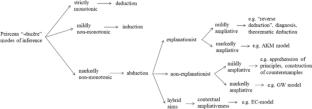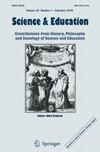Abduction as a Mode of Inference in Science Education
Abstract
The central argument of this article is that abduction as a “mode of inference” is a key element in the nature of scientists’ science and should consequently be introduced in school science. Abduction generally understood as generation and selection of hypotheses permits to articulate the classical scientific contexts of discovery and justification and provides educational insights into scientific methodology, this being a particularly important issue in science teaching. However, abductive reasoning has been marginally treated in the philosophy of science until relatively recently; accordingly, we deem it important to perform an “archaeology” of the concept that considers C. S. Peirce’s seminal contributions. We also choose to review contemporary treatments in order to recognise useful classifications to support more meaningful ways of teaching science and the nature of science. An elucidation of the participation of abductive inferences in knowledge construction seems necessary for us to derive conceptual input for the understanding and design of explanations in school science. Some prospective examples of “school scientific abduction” are discussed in the article through the lens of the results of our theoretical analysis.


 求助内容:
求助内容: 应助结果提醒方式:
应助结果提醒方式:


